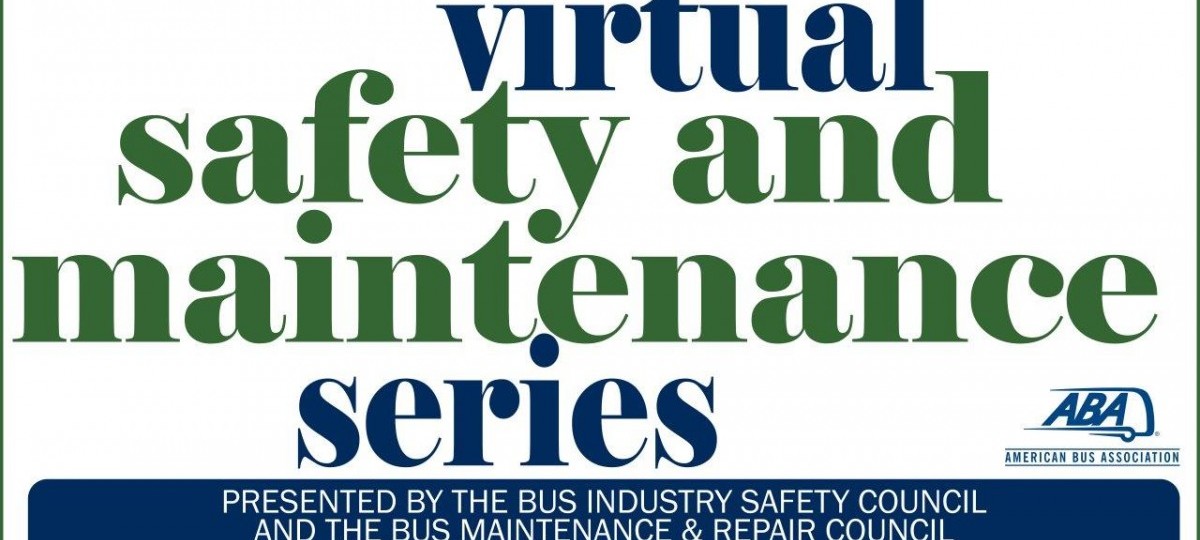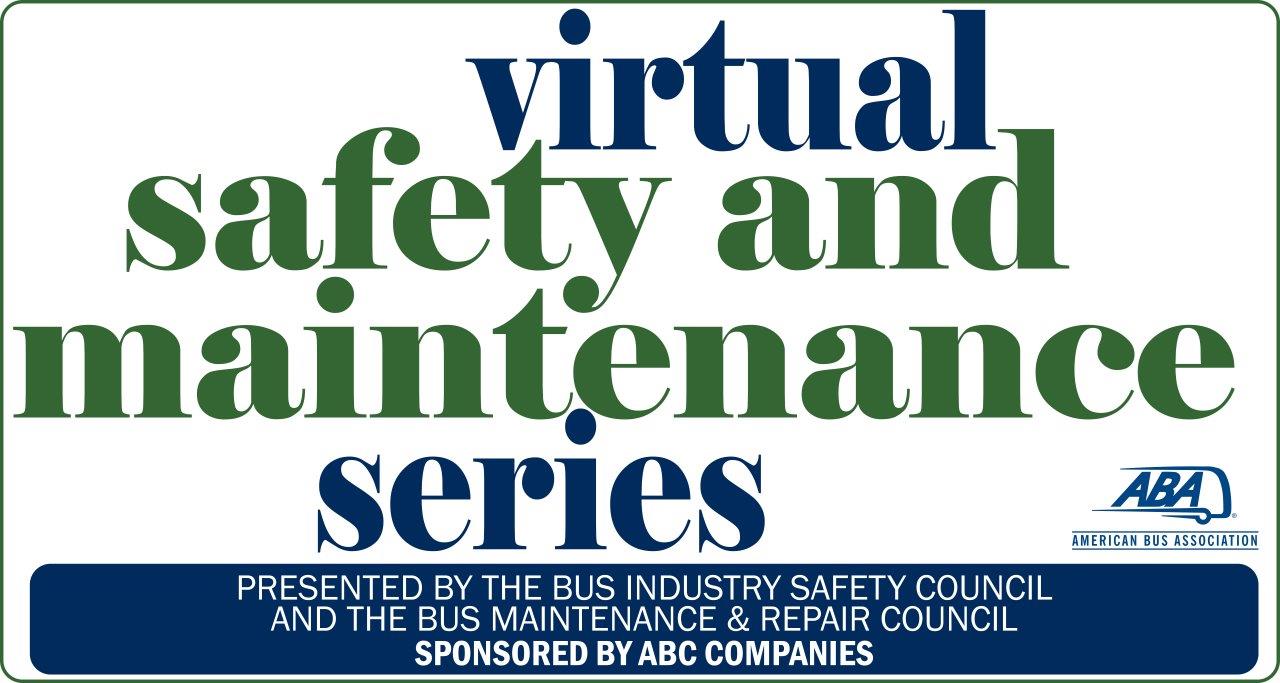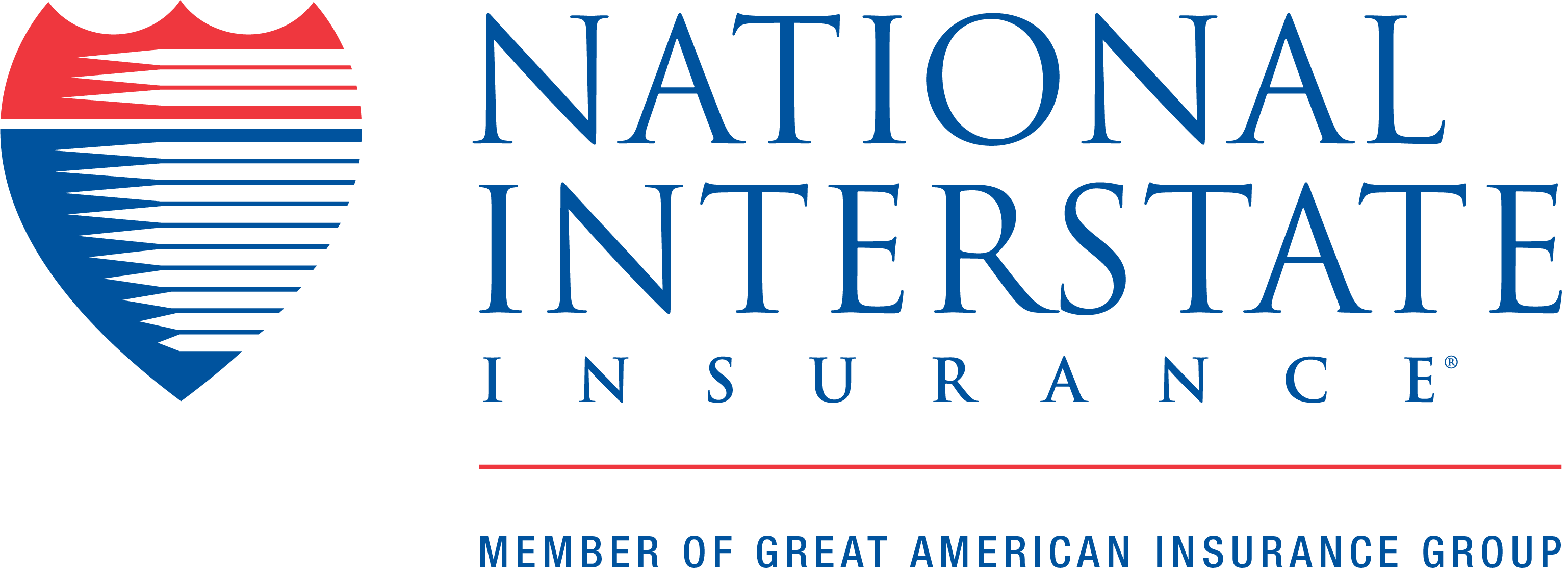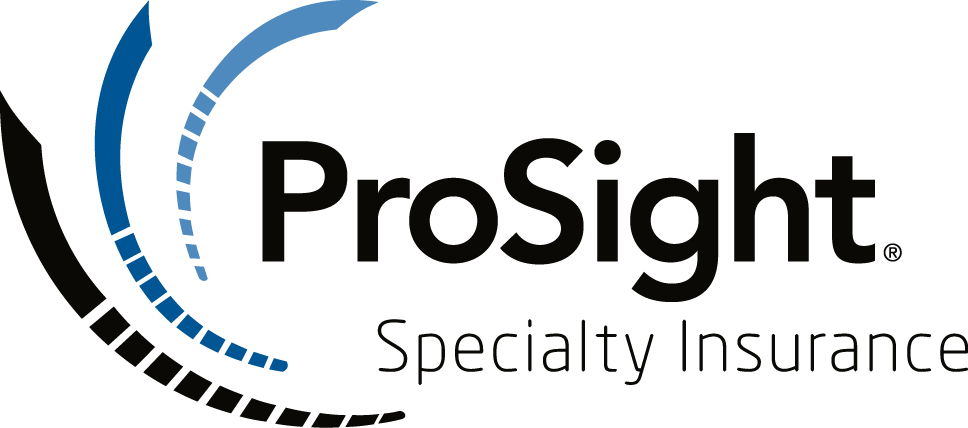BISC & BusMARC 2021 Virtual Safety & Maintenance Series

Webinar | Dec. 29, 2020 - Feb. 4, 2021
RESET, RECHARGE, RETURN TO THE ROAD in JANUARY With BISC & BusMARC Virtual Education
COVID-19 has challenged the bus and motorcoach industry. But we have been tested many times before. Each time, we’ve proved our resiliency, bouncing back. Because when people get together, even virtually, things get done.
Our in-person summer meetings were cancelled, so we put together a 6-week program of safety and COVID-19 response related education sessions to help keep you up to date in June & July 2020. With in-person sessions still on pause, we have decided to do a series again throughout January 2021 with 17 more safety, maintenence and compliance sessions scheduled. If you have a session idea or wish to see more sessions added, we would love to accomodate you, please contact us at bisc@buses.org.
The Bus Industry Safety Council (BISC) is your forum to address the latest safety and compliance topics that affect motorcoach operations. The Bus Maintenance and Repair Council (BusMARC) is your forum to address the latest safety and maintenance topics that affect motorcoach operations.
For this winter education series, no single registration is required and there are no fees to participate and for some sessions you will even receive a certification! All sessions are offered al a carte.

Education Schedule:
Following the dramatic and extensive impacts on the motorcoach industry as a result of the COVID-19 pandemic, time is nearing where motorcoaches can get back on the road and back to business. As we prepare to operate in this new reality, ensuring that your safety, maintenance and compliance program is prepped and ready to go is essential. With the assistance of the peer-to-peer sharing of our lauded industry experts, let BISC and BusMARC help show you the way!
Tuesday, December 29 |
|
| 11 am | “Access, Tips and Tricks for Bus Operators with the FMCSA Drug & Alcohol Clearinghouse”
This session will serve as a final reminder for Bus Operators that they must conduct their annual queries of the FMCSA Drug & Alcohol Clearinghouse by January 5, 2021. Our experts will help guide you through how to conduct these queries, but will also review some tips and tricks and common mistakes that operators make while trying to navigate this new system. Don't fall too far behind in your compliance efforts as we start to get back on the road. |
| 2 pm |
“Exploring the latest Surface Rule Training Videos & the new Surface Stakeholder Toolkit on the Homeland Security Information Network” This session is like Part II for those who particiapted in our session with TSA on December 15. This session will provide an overview of TSA’s InfoBoard for Surface Transportation on the Homeland Security Information Network (HSIN). Attendees can expect to receive: Check out this link to access materials covered during the session (registration required). |
Tuesday, January 5 |
|
| 11 am |
“Motorcoach Winterization 2.0” Your buses have been sitting idle throughout the pandemic, but now its time to restart your operations and we are in the middle of winter operations. What are some things that you should be thinking about maintenance-wise as you now have incorporated personal protective equipment (PPE) into your operations and your maintenance program? How will you change up your pre-trip inspection and restocking process? Do you need to change out your fluids or belts due to inappropriate storage or lack of periodic maintenance? What about special fuel considerations considering the weather? Get the facts from our experts during this session. |
|
2 pm |
“Getting Back to Work: Reviewing Driver Training Resources & Evaluations” After a long lay off, it is critical to be able to assess and evaluate the skills of your drivers, as well as re-familiarize them with the unique adjustments to be made to successfully handle your fleet. Considering how to approach evaluations of your drivers, equipment, and routes either on-board or en-route to detect areas where training or operational improvements should be made is something that we will all be approaching as we get back on the road. |
Thursday, January 7 |
|
| 11 am | “Bus Operation 101: Shop Orientation”
Motorcoach maintenance facilities come in all sorts of sizes and flavors depending on the space that you inhabit. However, knowing your way around the shop, and what types of tools you should keep there is something everyone should think about as they resume operations. How can things be optimized? Are there things that can be easily outsourced? Come armed with your questions, and don't miss out on our motorcoach facility virtual visit (Jan. 14). Learning from other motorcoach operators is one of the best ways to set yourself up for success! |
Tuesday, January 12 |
|
| 11 am | “Updating Your Security Capabilities, Policies and Protocols to Handle Teleworking Employees”
Motorcoach operators face a variety of security risks on a daily basis due to our precious cargo, flexible operational profiles and diverse operating environments. A new security risk that has emerged as a result of the COVID-19 environment is increased teleworking. What should companies be thinking about in terms of telework security policies? How should companies equip themselves to best handle new cybersecurity threats? |
| 2 pm | “Managing Commercial Motor Vehicle Driver Fatigue Risks”
Join representatives from the National Transportation Safety Board (NTSB) for a discussion on why and how companies can implement a fatigue risk management program. Reducing Fatigue-Related Accidents is part of the 2020-2021 Most Wanted List. Learn some tips on how to ensure that you stay out of the headlines, by learning from past accidents and severe crashes. The NTSB is the agency that launches a post-accident investigation following a fatal accident and makes recommendations to the industry as well as the government on what steps can be taken to avoid similar accidents in the future. What valuable lessons can we learn from recent fatal motorcoach and school bus crashes? |
Thursday, January 14 |
|
| 11 am |
“Virtual Site Visit and Tour: A Visit to Salt Lake Express” No BusMARC meeting is complete without us providing the unique opportunity to visit with a motorcoach operator facility and have them take us through their operation and provide us with some onsite education, now in a virtual format. For this meeting, we will be doing that via video, but participants will still have the chance to see something new and ask questions about the operation, capabilities and set up. |
Tuesday, January 19 |
|
| 11 am |
“A Review of FEMA's New Motorcoach Security Risk Assessment Tool” Motorcoach operators face a variety of security risks on a daily basis due to our precious cargo, flexible operational profiles and diverse operating environments and as a target of terrorist all over teh world. As a result of the annual intercity bus security grants, more and more operators are developing security plans and doing security assessments, but evaluating risk and quantifying that risk could be the missing link in our industry’s security preparedness. This session will familiarize you with a new tool to help you better evaluate the security profile of your operations. |
| 2 pm |
“Adjusting to a New World of Worker’s Comp and OSHA Reporting Changes” We are all adjusting to the significant impact of COVID-19 in the workplace and the regulatory requirements to ensure the safety and health of our employees and customers. In this session, we will review OSHA recordkeeping requirements as it relates to COVID-19 as well as discuss COVID-19 laws and legal updates and trends facing the industry in the coming months. There are also a number of compelling questions that you must consider for your passengers and your employees before you get going. What are some key questions to ask your staff and your insurance provider to help minimize any potential claims? With the assistance of the peer-to-peer sharing of our lauded industry experts, let BISC help show you the way! |
Thursday, January 21 |
|
| 11 am | “Back to Basics: Where the Rubber Meets the Road, Inventory Control, Warranty Review”
With much of America’s motorcoach operations grounded for the past several months during the COVID-19 outbreak, fleet managers are eager to get back to work. But what does that look like in a world where buses have been sitting idle for 90-days or more? Fleet management software systems that ensure vehicle efficiency, compliance, maintenance and safety are built to mainly monitor a fleet that is in motion – not one that is grounded. As the nation reopens from the coronavirus lock down, fleets need to move forward with a fresh outlook and new focus on maintenance standards. During this session, we will look into tire maintenance best practices. How to adjust for anticipated air leakage, potential sidewall deterioration, rebalancing or reseating recommendations, as well as how to control your parts inventory and stay on top of warranties. |
Tuesday, January 26 |
|
| 11 am |
“Saving Pennies at the Pump: Fuel Maintenance, Controlling Contamination, Filter Monitoring, Questions on Additives” Your buses have been sitting idle throughout the pandemic, but now its time to restart your operations. Should you pump out your stored fuel? Do you have the right blend? Get the facts from our experts during this session. Since there are no currently adopted industry standards addressing the use of fuel additives, it is not surprising that problems arise when they are blended improperly, or incompatible fuel additives are mixed together in the fuel. One of the most well-known fuel chemistry problems is the reaction of acids and bases contained in lubricity and corrosion inhibitor additives. Operators sometimes use additional additives with the misconception that more is better; and when the total additive dose becomes too high, soft contaminants can quickly and prematurely plug filters, reducing the expected service interval. Join our discussion! |
| 2 pm |
“A New Age of Enforcement: Adjusting to Remote and Offsite Investigations & How to Prepare” COVID-19 has impacted every facet of our operations, even our interactions with our enforcement partners. FMCSA has transitioned from on-site and in-person compliance reviews and focused investigations to more remote and offsite interactions. Although the definition of “compliance review” in 49 CFR 385.3 describes these reviews as “on-site,” in practice, the emergence of electronic record keeping and other technology now allows FMCSA to perform the same investigative functions remotely that it could perform previously only by in-person reviews of the motor carrier’s files. Operators can access and transmit their information through the portal directly to FMCSA and upload documents in a secure environment. Many operators already maintain their records electronically, which can make these remote investigations almost seamless. Learn more about how to prepare for these new interactions with enforcement officials and our BISC experts today! |
Thursday, January 28 |
|
| 11 am | “Back to Basics: The Back of the Bus, Everything Engines, Batteries & HVAC”
There is a lot for operators to consider before they consider changing their HVAC setup, the type of filters they use or their preventative maintenance program in this new COVID-19 reality. Learn more about the performance thresholds for this equipment and what might work best for you as you get back to full-time operations. Plus don't let improper battery maintenance, keep you from putting your best foot forward. During this session, learn how to avoid battery drain, tips to improve battery health and how to jump start your operations. As we begin to restart things again, we don't want to see you stuck with any maintenance problems at the side of the road. In addition, take home a few tips on how to better maintain your in-use equipment to improve efficiency and performance. |
| 2 pm | Product Spotlight: Valeo AC “Keeping Your Drivers & Riders Safe, Exploring HVAC Solutions For COVID-19 And Beyond” Motorcoach operators face some interesting decisions in the months ahead. Today, HVAC modernization investments and modifications are demanded by COVID-19 to help ensure passenger confidence and bring riders back. There are many voices offering recommendations, yet understanding what is available and what makes the most sense for your operation, plus how to maintain it, is what we will explore in this session. Social distancing by at least six feet remains the primary method to avoid COVID-19 contact. However, increasing the circulation of HVAC systems if possible, on vehicles, introducing outside air when possible to create a dilution of air effect is another highly effective mitigation technique. Find out more today! This session is sponsored by Valeo AC |
Tuesday, February 2 |
|
| 11 am |
“Safety Director 101” This is another offering in a new series of sessions, specially designed for brand new fleet managers, safety directors, transportation professionals and even company owners. This session should help you understand the basics of what goes into a monitoring driver performance, compliance with the hours of service and how to conduct remedial driver training for your existing drivers. After this session, you should be well on your way to being more in control of your operations. |
| 2 pm | “Crisis Communications: How Will You Respond to an Emergency Situation? What Will You Say or Do?”
Keeping an organization resilient through a crisis requires advanced planning and practice on what to do and what to say, as well as identifying who should do it. Reactions to the crisis are one of the most critical pieces to control in the event of a high-profile accident or travel disruption. If reactions get out of hand, your reputation, bottom line and customer satisfaction could be negatively impacted. Putting together a response plan as we get back to traveling in a post-COVID environment should be top of mind. Get started on your plan today with our experts. |
Thursday, February 4 |
|
| 11 am |
“Back to Basics: Handling Open Campaigns and Vehicle Recalls” A vehicle recall is often issued when a manufacturer or the National Highway Traffic Safety Administration (NHTSA) determines that a vehicle, equipment component, seat, or tire creates an unreasonable safety risk or fails to meet minimum federal safety standards. Most decisions to conduct a recall and remedy a safety defect are made voluntarily by the manufacturers prior to any involvement by NHTSA. Additionally, manufacturers may notice a trend or common problem based on customer feedback and may issue a safety bulletin or conduct a campaign to remedy those mechanical situations before having to issue a recall. Find out more about this process and recent recalls and campaigns that may be impacting your operations. |
Registration is Open Throughout the Series
Special Thanks to all of Our Sponsors





